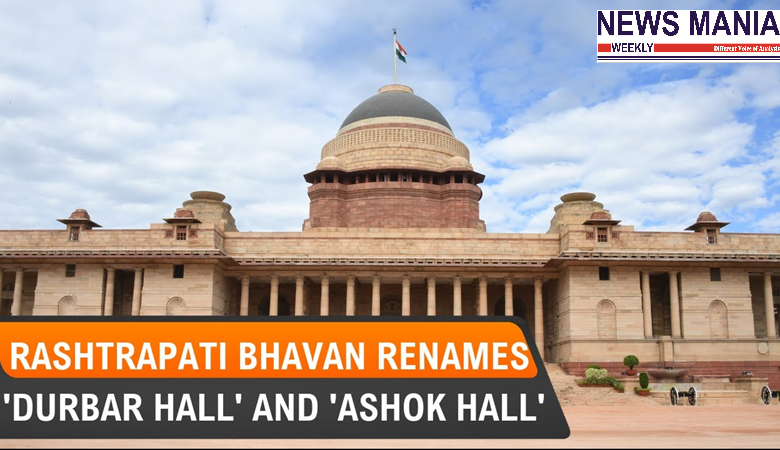Rashtrapati Bhavan Renames Durbar and Ashok Halls to Reflect Indian Heritage

News Mania Desk/Agnibeena Ghosh/25th July 2024
The iconic Durbar Hall and Ashok Hall in Rashtrapati Bhavan have been renamed to better align with Indian heritage and values. The halls will now be known as Ganatantra Mandap and Ashok Mandap, respectively.
Durbar Hall, historically a venue for significant ceremonies such as the presentation of National Awards, has a name rooted in the assemblies and courts of Indian rulers and the British colonial era. The term “Durbar” lost its relevance after India became a Republic, or “Ganatantra.” The President’s Secretariat explained that the concept of “Ganatantra” has deep historical roots in Indian society, making “Ganatantra Mandap” an appropriate and meaningful name for the venue.
Ashok Hall, originally a ballroom, is named after the revered Emperor Ashok, a symbol of unity and peaceful coexistence. The term “Ashok” signifies being free from suffering and sorrow. The National Emblem of India, the lion capital of Ashok from Sarnath, also bears this name. Additionally, the Ashok tree holds significant cultural and religious importance in India. Renaming Ashok Hall to “Ashok Mandap” maintains linguistic uniformity and eliminates traces of anglicization while upholding the values associated with the name Ashok.
The renaming initiative is seen as a move to emphasize India’s rich cultural heritage and historical significance. It is part of a broader effort to ensure that prominent national symbols and venues reflect Indian values and traditions.
However, not everyone views the renaming positively. Congress leader Priyanka Gandhi Vadra criticized the move, stating, “ye darbar ka concept nahi shehenshah ka concept hai” (This is a king’s concept, not a darbar’s). Her comment suggests a belief that the renaming reflects a regal or monarchical mindset rather than a democratic one.
The renaming of these halls is more than a symbolic change; it represents a shift towards embracing and honoring India’s indigenous culture and history. By aligning these significant venues with terms deeply embedded in Indian tradition, the renaming reinforces a sense of national pride and cultural continuity.
Rashtrapati Bhavan, the official residence of the President of India, is not just an architectural marvel but also a symbol of the nation’s democratic ethos and rich heritage. The renaming of its prominent halls to Ganatantra Mandap and Ashok Mandap is a step towards reinforcing these values.
This initiative also reflects a broader trend in India of reevaluating and renaming colonial-era institutions and landmarks to better reflect the country’s post-independence identity. It underscores the importance of language and names in shaping national consciousness and collective memory.
The renaming of Durbar Hall and Ashok Hall signifies a respectful nod to India’s past while firmly rooting in the present democratic values. As the country continues to evolve, such changes remind citizens of their rich cultural legacy and the ongoing journey of the Republic. The move aims to inspire a sense of unity and pride among Indians, reflecting the country’s diverse yet unified spirit.
This renaming is expected to pave the way for similar initiatives across the country, encouraging a nationwide re-evaluation of historical names and their relevance in contemporary India. It emphasizes the significance of heritage in national identity and the role of public spaces in preserving and promoting cultural values.






